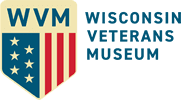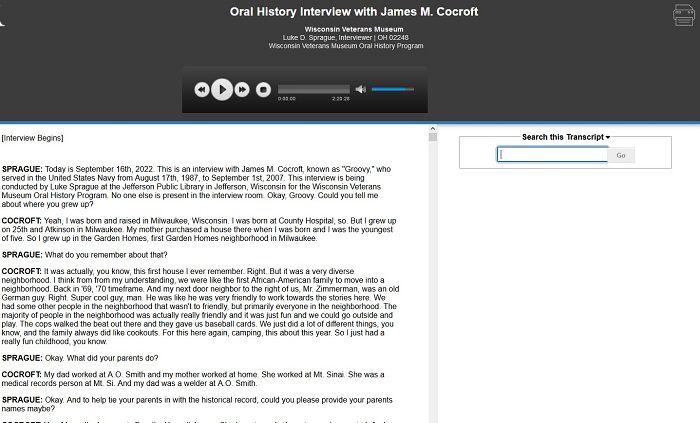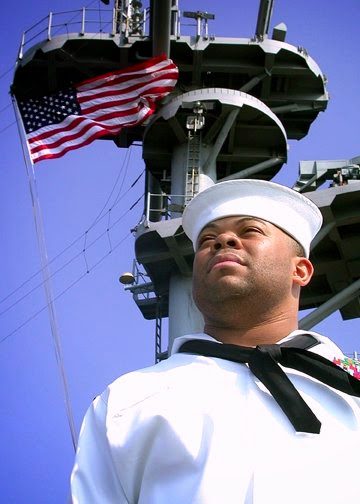
James M. Cocroft, United States Navy.
James M. Cocroft, also known as “Groovy,” served in the United States Navy from August 17, 1987, to September 1, 2007. Cocroft grew up in Milwaukee, attended Milwaukee Public Schools, and graduated from South Division Highschool in 1987.
The Cocroft family has a deep military service tradition in Wisconsin. The Cocroft family includes multiple generations who served in the United States military, including Cocroft’s father, brother, sister, uncles, and cousins. His cousin Robert A. Cocroft attained the rank of Brigadier General and later served as Deputy Secretary of the Wisconsin Department of Veterans Affairs (WDVA). The Wisconsin Veterans Museum features him in this blog post.
Other influencers include his two uncles, Nathaniel Harwell and Lawrence Harwell. Nathaniel Harwell was a founding member of the National Association for the Advancement of Colored People (NAACP) Youth Council with Father James E. Groppi. Lawrence Harwell was the chief executive officer of the Milwaukee organization, Organization Of Organizations (Triple O) and a State Representative Polly Williams' staff member who helped Dr. Howard Fuller write Wisconsin’s school choice program.
Uncles Lawrence and Nathaniel Harwell
In August of 1987, Cocroft enlisted in the Navy, along with two high school friends, under its Buddy Enlistment Program. Four weeks into boot camp, the Navy told Cocroft and his two friends their Buddy Program enlistment contract was null and void because there were three individuals on the contract, and they could choose to exit the Navy without penalty. Cocroft decided to stay in.
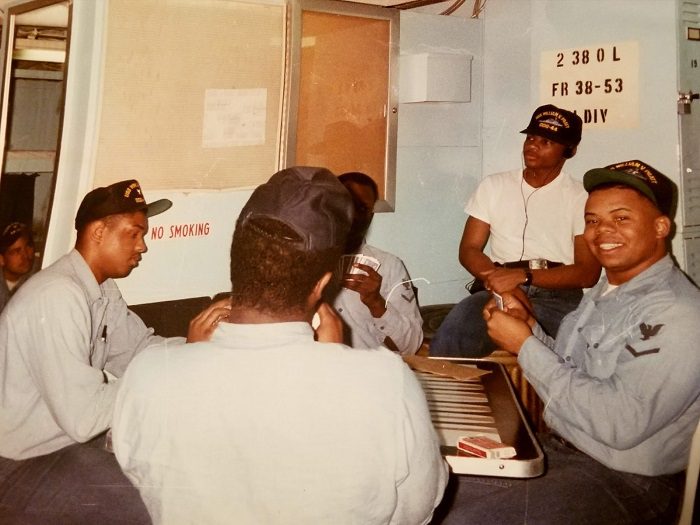
Cocroft and peers playing cards aboard the USS Pratt (DDG-44).
Cocroft arrived on the USS William V. Pratt (DDG-44) in Charleston, South Carolina, on January 2, 1988. There, he received initial training in firefighting and security force weapons. At this time, Cocroft received on-the-job training as an Operations Specialist (OS), his chosen career field. His initial work as an OS was on the surface: tracking all contacts, radio log-keeping, and ensuring the ship didn't hit anything. While serving in the Caribbean, the Pratt also assisted the Coast Guard with narcotics operations. Later, as part of the Sixth Fleet, the Pratt participated in two Mediterranean cruises and Operation Desert Storm. During Desert Storm, the Pratt interdicted weapons from being smuggled into Iraq and provided a plane guard for the aircraft carriers.
Operations Specialist aboard the Pratt
Next, Cocroft received orders to report to USS Samuel Eliot Morison (FFG-13), also in Charleston, South Carolina. As a reserve frigate, the Morison was responsible for training reservists and performing interdictions in the Caribbean. However, the Morison had a partial crew, making things difficult. Cocroft served on the Morison from 1992 through part of 1994.
After finishing his tour with the Morison, Cocroft went on shore duty at Naval Hospital Charleston in North Charleston, South Carolina. He first worked in the motor pool and later in hospital security.
Orders for Italy and the Sixth Fleet
Cocroft’s next tour of duty was as a member of the Sixth Fleet Staff onboard the flagship, the USS La Salle (AFG-3), in Gaeta, Italy. Cocroft worked as an Operations Specialist (OS) under Admiral Charles S. Abbot, Sixth Fleet Commander, and maintained the operational picture for the entire Mediterranean. During this time, the Sixth Fleet planned military actions in Kosovo. As part of the Sixth Fleet Staff, Cocroft visited many European countries and attended dinner parties with allied counterparts. It was in this casual atmosphere that Cocroft remembers a relaxation of the traditional separation between enlisted sailors and officers as compared to what he experienced on other ships.
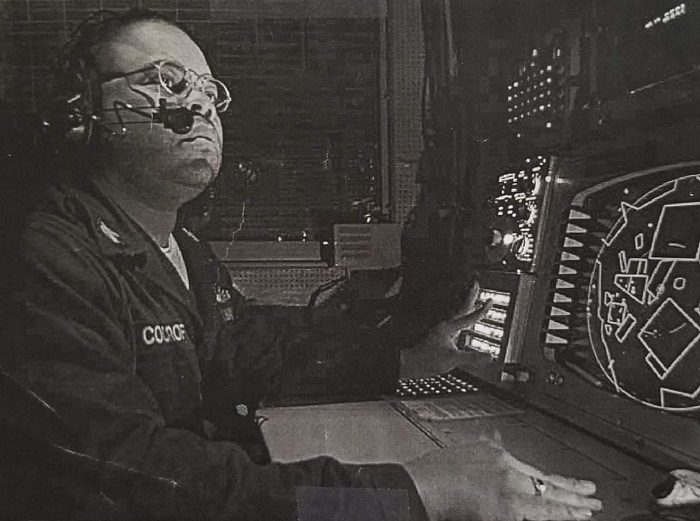
Cocroft working as an Operations Specialist.
In 1998, the Navy assigned Cocroft to the USS The Sullivans (DDG-68) in Mayport, Florida. Unfortunately, Cocroft was injured while playing football and stayed behind when The Navy sent The Sullivans to the Persian Gulf. Intelligence later determined that The Sullivans had been the target of an unsuccessful attack by al-Qaeda. On September 11, 2001, Cocroft was on light duty at the Transient Personnel Unit (TPU) in Norfolk, Virginia. He learned that two individuals he served with on the La Salle died at the Pentagon on 9/11: Commander Patrick Dunn and Ronald Hemenway, Electronics Technician Petty Officer First Class.
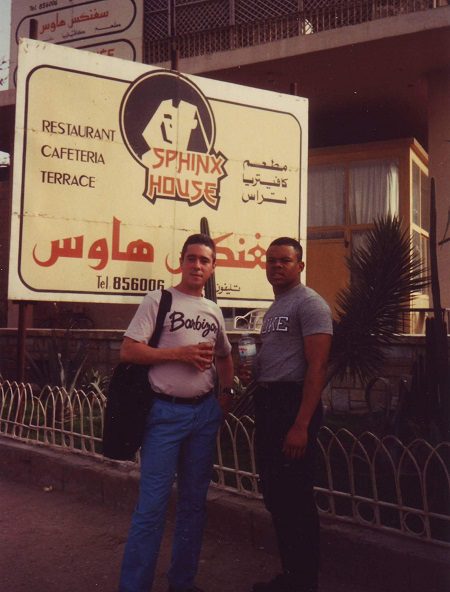
Cocroft and unidentified person in the Middle East.
Cocroft then served on the USNS Capable (T-AGOS-16) for counter-narcotics operations in the Caribbean with both Navy and civilian personnel.
Following that, Cocroft received orders to report to the USS Kearsarge (LHD-3) out of Norfolk, Virginia, where he was the Interface Control Officer (ICO) and trained on the air side. In 2003, the Kearsarge deployed for Operation Iraqi Freedom and became the flagship for all amphibious assaults. The Kearsarge transported marines from Morehead City, North Carolina, and equipment from Marine Corps Base Camp Lejune to the Persian Gulf. These marines were part of a Marine Expeditionary Unit (MEU) sent into Fallujah, Iraq. Enemy actions in Fallujah killed twenty-three marines, including Marine Lance Cpl. Thomas A. Blair whose death affected Cocroft.
Lance Corporal Blair
Cocroft remained with the Kearsarge until February 2004, when he received orders to report to Detachment 2, Naval Center for Tactical Systems Interoperability (NCTSI). While at NCTSI, Cocroft went to every East Coast ship, testing baselines for every military platform.
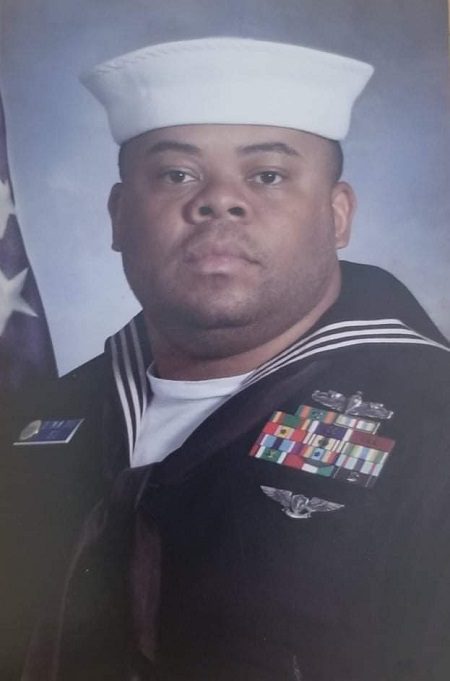
James M. Cocroft, United States Navy.
In 2003, Cocroft met Carl M. Brashear at Navy Federal Credit Union in Norfolk, Virginia, and spoke to him about his experiences in the Navy. Brashear was the first African American master diver in the Navy, and 20th Century Fox made his life story into the movie Men of Honor.
Meeting Carl Brashear
While serving, Cocroft found the family separation difficult. After twenty years of service and achieving a rating of Operations Specialist First Class (OS1), Cocroft was ready to leave the military. Although the Navy offered assignments in Africa or the Middle East, he declined them. Instead, he skipped his retirement ceremony, took terminal leave, and returned to Milwaukee, Wisconsin, in May 2007. Like many veterans, Cocroft initially struggled in civilian life and was isolated from his family. But he later sought mental health care, and that helped him cope.
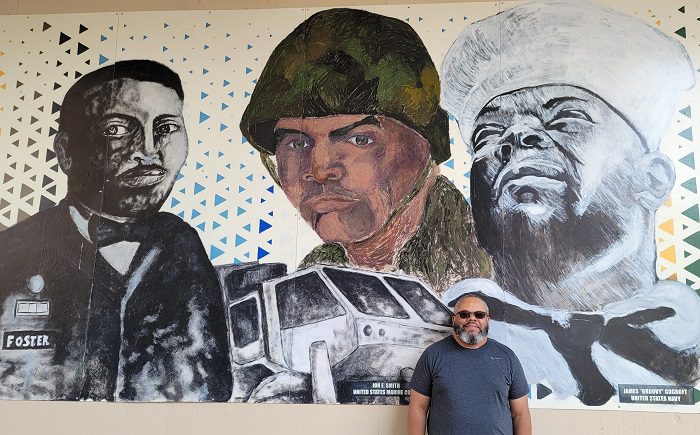
Cocroft standing in front of the Veteran Print Project mural on the exterior of the Wisconsin Veterans Museum, on display 2019 to 2021.
Attending the University of Wisconsin-Milwaukee (UWM), Cocroft used his Veterans Affairs work-study financial aid for a job at the UWM Military and Veterans Resource Center (MAVRC). He currently serves as MAVRC’s assistant director. Cocroft shares his insights with veterans about his difficulties transitioning to civilian life and the importance of mental health treatment. In addition, he connects his military service and veteran advocacy work to his family upbringing. Cocroft finds it rewarding to serve veterans and improve their lives.
Working at MAVRC
To listen to the oral history interview for Robert M. Cocroft (OH2248), click here or on the image below.

